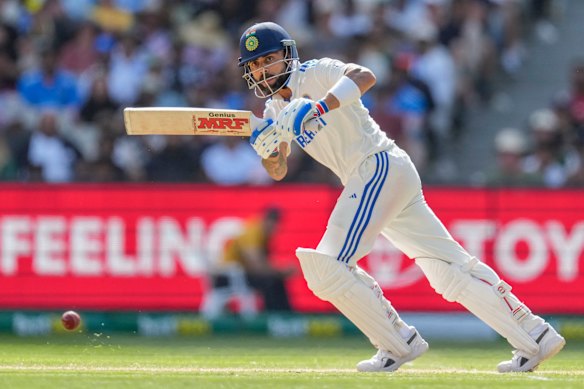Our Terms & Conditions | Our Privacy Policy
Virat Kohli retirement: The greatest Indian cricketer of all time bows out of Tests
If England was redemption, Australia in 2018-19 was his coronation. India had never won a Test series in Australia. Kohli, now captain, led a team that believed it could – and did. Though Cheteshwar Pujara was the statistical hero, Kohli’s 123 at Perth on a devilish pitch was an innings for the ages. It was Test cricket in its rawest form – discipline, fight, elegance, and grit. India won 2–1, and in doing so, buried decades of inferiority.
No Indian captain had ever marshalled a team to such commanding overseas dominance. And no batsman since Tendulkar had so unequivocally ruled in every continent.
‘He was the most Australian non-Australian cricketer we’ve ever seen – a snarling warrior in whites.’
Kohli’s greatest innings have been more than runs – they’ve been statements. His 141 in Adelaide (2014), in his first Test as captain, chasing a monumental fourth-innings target, was an early blueprint. The 153 at Centurion (2018), the 200 in West Indies (2016), and the exquisite 254 not out at home against South Africa – each told a different story of his arsenal.
He was a ‘feel’ player, relying on immaculate timing rather than brute strength. Heavy bats didn’t interest him. Instead, he brought a two-handed, almost tennis-like aggression to slower pitches, making straight batted drives look like power strokes from another dimension. He rarely needed innovation – no scoops or reverse sweeps. His genius lay in classical orthodoxy applied with gladiatorial will.
Kohli’s mental preparation was legendary. After every setback — whether personal or professional — he went away and returned harder, leaner, more complete. His father’s death during a Ranji match in 2006 remains a defining moment. He didn’t withdraw. He batted – and scored 90 in a backs-to-the-wall innings – because that’s what his father would have wanted.
He spoke candidly in later years about visualising hostile conditions, hostile crowds, and hostile spells before every overseas tour. He trained not just his body but his imagination. That is Kohli’s true superpower. Where others reacted, Kohli anticipated. He saw innings before they unfolded. He lived the pressure before it arrived.
Virat Kohli in full flight.Credit: AP
And in the cauldron of global scrutiny – with a billion people watching his every move – Kohli taught himself to breathe. As he once said: “If I focus on all that, I can’t breathe. I have to focus on what I can do.”
Kohli burst onto the scene as a brash, chest-thumping under-19s World Cup-winning captain in 2008. Some wondered whether the strut outpaced the substance. He made mistakes, no doubt. But when the wake-up call came – particularly after a dip in discipline and lifestyle early in his career – he turned brutally honest with himself. He revamped everything: diet, training, mindset.
In doing so, Kohli became the blueprint for the modern Indian cricketer – relentlessly professional, obsessively fit, and mentally ironclad.
His evolution mirrored that of India itself – no longer content to play the supporting act. Confident, global, yet deeply connected to its roots. His global stardom ran parallel to the rise of the IPL, yet he never let the glitz distract from his Test ambitions. He made white-ball cricket his domain without sacrificing a drop of red-ball purity.

Virat Kohli poses with the Border-Gavaskar trophy in 2019.Credit: Getty Images
Yes, Tendulkar was a genius. Yes, Dhoni was a master tactician and an ice-cold finisher. But in the grand reckoning of Indian cricket history, Kohli has been its most influential figure.
Why? Because he changed not just results, but mindsets.
He demanded excellence. He made fast bowling India’s weapon. He backed his bowlers, he stood up to bullies, and he never played for second place. He wanted Test cricket to thrive and knew that for India to be respected, it must dominate the hardest format.
Loading
His public defence of Steve Smith during the 2019 World Cup – urging Indian fans to stop booing – was a statesman’s act. The hot-headed kid had become cricket’s conscience.
As Kohli exits the Test arena, he leaves behind not just a glittering record – more than 8000 runs, 30 centuries, historic wins overseas – but a blueprint for how to play the game with heart, with hunger, and with unyielding pride.
He was polarising, yes. But so is every revolutionary.
He walked with a swagger, was demonstrative on the field, and occasionally played hard. And in doing so, he became the icon of an India no longer content to play supporting roles. He was a beacon to Indians everywhere – a cricketing colossus from the subcontinent striding across Lord’s, Adelaide, Centurion and Kolkata with the same fearless heartbeat.
In every sense of the word, King Kohli reigned – and his influence will be felt long after the roar has faded.
All hail the King. And thank you, Virat – for making us believe that domination and dignity could walk together.
Images are for reference only.Images and contents gathered automatic from google or 3rd party sources.All rights on the images and contents are with their legal original owners.



Comments are closed.